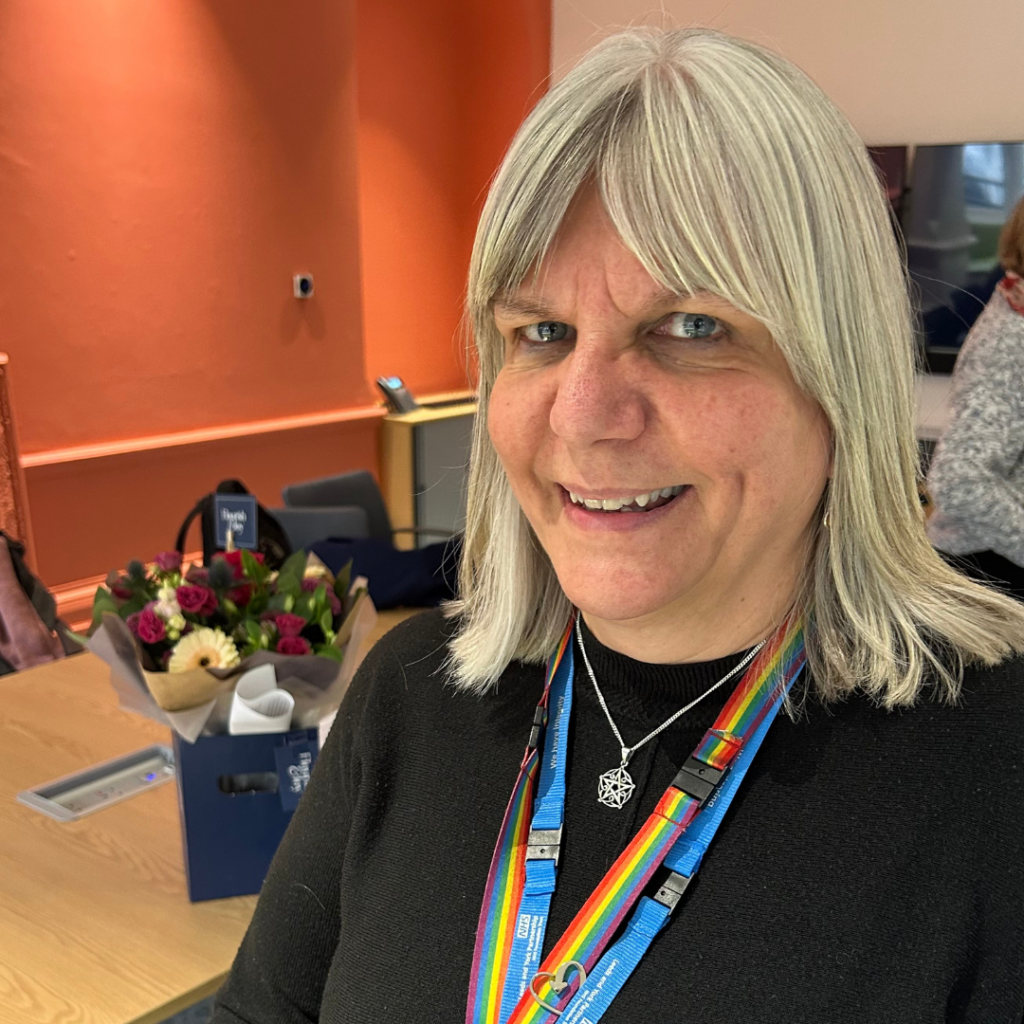Leadership blog December 2023
Our Chief Exec Dr Sara Munro’s final leadership blog of 2023.
My final leadership blog of 2023 comes at the onset of winter, and in the midst of immense challenges mainly across patient flow, workforce shortages and financial deficits.
However, as we do at our Trust Board meetings, I’d like to start by sharing a positive story.
Service user involvement in our Rehab & Recovery (R&R) Service
Four staff from our R&R service presented to November’s Trust Board on how they’d been involving service users to improve quality, outcomes and service user experience.
The team explained their approach to co-production using the co-production ladder, why we need it and how they were applying it in practice. This included sharing their co-production group’s logo designed by a service user.
Three of the team were doing this work on top of their day jobs which really demonstrates their passion and commitment to their service users.
We heard an interview recorded with one of their service users who described what they’d got out of the work, which was both heart-warming to hear first-hand, and demonstrates real impact.
The team were clearly proud of the high levels of participation, how it was making a visible difference to quality of care, and the positive feedback they’d received.
So well done to Anita Nila, Jessica Masterson, Amie Beswick and Chloe Mailey – we can all learn a lot from you. You can read their presentation here.
Creating the right leadership culture
I’ve been privileged to be part of our collective leadership journey. This is a programme of development for an 80-strong cohort of senior leaders across the Trust to build shared goals, shared knowledge and applying a shared approach to solving problems and achieving better outcomes.
A great example of where this approach has paid off is the stabilisation of our community mental health services over the past 12 months. The teams are now much more settle and are maintaining reductions in caseload sizes, improving response times to new referrals and starting to see an improved picture in recruitment.
In our last event of the year in November the Collective Leadership cohort applied our collective thinking to achieving ‘effective integrated governance’. What that means is how we make decisions as close to the front line as possible whilst retaining clear line of sight on things like safety and risks.
Sometimes our governance processes can be a bit confusing, or even self-defeating – meaning decisions can be pushed around internally. I want to use the principles of collective leadership to help us solve this complex problem.
How it feels at the front line
Our services are actively preparing for the additional challenges that winter brings including capacity and flow in our inpatient services. Workforce shortages are certainly nothing new, and winter puts this under extra pressure with the inevitable spikes in sickness absence. The spectre of industrial action still hangs over us despite some progress on a settlement for doctors (fingers crossed).
With our inpatient wards at capacity and struggling to discharge due to do pressures in other parts of the system, this means service users suffer delayed transfers of care and we have to place people out of area. Finding suitable accommodation for our inpatients on discharge is proving really tough, and we are working with our local authority housing colleagues to improve this picture.
During October, I and other executive directors visited all the working age adult inpatient wards at the Becklin Centre, and some of our older people’s wards at The Mount. We had direct and frank discussions with ward staff on the current context they are operating in, recruitment, morale, team development, risk management, cross ward support, patient flow and care pathways. We were all impressed with their levels of commitment, motivation and focus on quality of care – as well as how they supported each other.
Triumph in the face of adversity
Despite their difficult staffing position, the team at our young people’s inpatient unit Red Kite View has been successfully developing their service. This includes:
- a neurodevelopmental assessment pathway which has already assessed 11 young people who were previously undiagnosed, and
- A post discharge follow-up from the social work team, supporting a “softer landing” for young people following their stay – which also allows the team to gather feedback post discharge.
We have seen an improvement in the flow through the service and, working alongside partners, this has helped us to meet the need for specialist inpatient beds across West Yorkshire. At the time of writing there were no young people waiting for a psychiatric intensive care unit bed!
Long term plans for mental health and learning disabilities
The NHS Long Term Plan reaches the end of its current five-year term in 2024, and NHS England has started to engage local systems and providers of services to shape the next wave of priorities.
We anticipate there will not be any significant increase in funds available, so therefore we need to decide what we prioritise within existing resources learning from the last five years.
Currently the focus is on things like:
- Quality of inpatient care,
- Model of adult acute care,
- Crisis care,
- Children and young people’s mental health,
- Autism and ADHD service provision,
- A continued focus on workforce supply and shape, and
- A need for capital investment in both inpatient and community care.
Looking at more immediate pressures, NHS England’s executive team held a face-to-face meeting with chief executives in November. We discussed things like:
- The current challenges and risks for the NHS,
- The ask for the remainder of this financial year on how we spend our budgets in an effort to control growing deficits,
- Service delivery priorities for 2024/25,
- The political context in the year ahead (we are expecting a general election at some point), and.
- Progressing the long-term workforce plan.
Reasons to be proud
It’s a bumper awards edition of reasons to be proud this month!
 Firstly, huge congratulations to Julie McGrath (pictured left) who’s received the highly coveted Chief Nursing Officer award 2023 for support worker excellence.
Firstly, huge congratulations to Julie McGrath (pictured left) who’s received the highly coveted Chief Nursing Officer award 2023 for support worker excellence.
Our own Director of Nursing Nichola Sanderson managed to surprise Julie with a special presentation in November.
Julie’s career in the NHS spans 28 years, including 19 years in our Assertive Outreach Team, most recently as Assistant Case Manager, which works with people with ongoing complex mental health needs.
She has been commended for the positive impact she has had, not only on patients but also her patients’ loved ones, through building good relationships to provide outstanding patient care.
She has also been recognised for championing equality, diversity, and inclusion in everything she does, both in clinical practice and with her colleagues.
Health Service Journal award for Synergi-Leeds
Synergi-Leeds, a partnership between the NHS, Public Health, and the local community and voluntary sectors (VCS), was named Mental Health Innovation of the Year at the HSJ awards in November. This is a fantastic award to recognise both the level of partnership working and the ambition to make a difference to our diverse communities in Leeds. Read more about how they wowed the judges on our website.
Their next initiative is Remembering What’s Forgotten, a 12-month hybrid programme and exhibition championing community and lived experience narratives to tackle the overrepresentation of black and South Asian men detained under the Mental Health Act. The exhibition was launched in November, read more on our website.
Gold standard for being an armed forces-friendly employer
We’ve been given the highest badge of honour for supporting members of the Armed Forces community including veterans and reservists in employment once they leave. We are one of only three organisations in Yorkshire and the Humber to have been awarded the Defence Employer Recognition Scheme (ERS) 2023 Gold Award – recognising the positive role that employers play in supporting the Armed Forces community.
Staff who’ve led this work attended a ceremony in York on 14 November where they were officially commended by West Yorkshire’s Lord Lieutenant, Ed Anderson, alongside fellow regional gold standard bearers Leeds City Council and Phillips 66 Limited.
Our latest Team of the Month is . . .
The West and North West Community Mental Health Team! We are very grateful to those who volunteered to be redeployed to the CMHT in pressured times. Through their nomination it was great to hear how this was useful for personal development and growing understanding of the wider Trust. It was particularly fantastic to hear that the team were so welcome and supportive. Well done guys.
Pastoral Care Quality Award
We have been recognised for our work in international recruitment and commitment to providing overseas nurses and midwives with high-quality pastoral care. This award is part of the NHS England International Recruitment Programme. It supports NHS organisations in increasing and developing their international recruitment plans. We have been recognised for offering a “safe arrival, induction,
and provision of support for new people joining the NHS workforce and prioritising the wellbeing of internationally educated nurses and midwives.”
And this month’s research hero is . . .
Dr Tom Riley for his support as a “super referrer” for the DIAMONDS RCT study!
Research Heroes are individuals who are part of a hidden army of staff supporting research across the Trust. Tom not only thought about people on his own caseload who might meet the eligibility criteria for the study, but also made his colleagues aware of the study and encouraged them to identify service users from their caseloads too.
